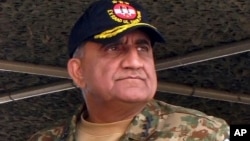Pakistan’s prime minister, Nawaz Sharif, appointed his new military chief Saturday to replace Chief of Army Staff General Raheel Sharif, who is due to retire on November 29 when his official three-year term ends.
The new chief, Lieutenant General Qamar Javed Bajwa, is expected to take charge next week of the world’s sixth largest military in a formal handover ceremony in Rawalpindi, where the Pakistan army is headquartered.
General Bajwa’s appointment comes at a time when Pakistan’s military tensions with neighboring India are running high over Kashmir.
The two nuclear-armed rival nations have been routinely trading fire for weeks, causing military and civilian casualties on both sides of the Line of Control, or LoC, which divides the Himalayan region between Pakistan and India.
General Bajwa, among other key assignments, has commanded the army’s largest ’10 Corp’, which is also responsible for the area along the Kashmir LoC. The current tensions with India, say analysts, appear to have played a role in Bajwa’s appointment because of his “extensive involvement with Kashmir affairs”.
According to his profile released by the military’s media wing, the newly-appointed military chief is a graduate of the Canadian Forces Command and Staff College (Toronto), California’s Naval Post Graduate University in Monetary, and has commanded the Pakistan Contingent in Congo.
General Bajwa is presently serving as Inspector General Training and Evaluation at the General Headquarters.
Prime Minister Sharif also appointed Lieutenant General Zubair Hayat as chairman of the joint chiefs of staff committee.
Outgoing General Sharif (no relation to Prime Minister Sharif) has become Pakistan’s first army chief in more than 20 years to step down on time.
His immediate predecessor obtained a three-year extension while the previous army chief, General Pervez Musharraf, staged a bloodless coup in 1999 and ruled Pakistan until he stepped down in 2008.
General Sharif is credited with improving national security and rooting out local and foreign militant networks from their bases in Pakistan’s northwestern semiautonomous tribal regions bordering Afghanistan.
He also ordered forces to undertake a major operation against criminal gangs and militant groups in Karachi, the country’s largest city and commercial hub.
The operation won General Sharif nationwide praise for improving the security situation in Karachi, the economic lifeline of Pakistan.
The counter-militancy and counterterrorism actions have made General Sharif an immensely popular figure among ordinary Pakistanis.
But critics questioned his unannounced control over foreign policy matters, particularly when it came to Pakistan's dealings with Afghanistan and India.
Prime Minister Sharif's political opponents, however, blamed his weak governance for allowing the military to assert itself.
Afghan leaders allege Pakistan's military action in border areas spared Taliban insurgents and their partners, the Haqqani Network.
Instead they blame Islamabad for covertly supporting and providing sanctuaries to the insurgents to prolong the war in Afghanistan.
Pakistani civilian and military officials reject the charges.




